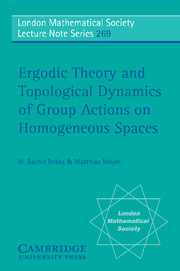Book contents
- Frontmatter
- Contents
- Preface
- Acknowledgment
- I Ergodic Systems
- II The Geodesic Flow of Riemannian Locally Symmetric Spaces
- III The Vanishing Theorem of Howe and Moore
- IV The Horocycle Flow
- V Siegel Sets, Mahler's Criterion and Margulis' Lemma
- VI An Application to Number Theory: Oppenheim's Conjecture
- Bibliography
- Index
I - Ergodic Systems
Published online by Cambridge University Press: 05 August 2013
- Frontmatter
- Contents
- Preface
- Acknowledgment
- I Ergodic Systems
- II The Geodesic Flow of Riemannian Locally Symmetric Spaces
- III The Vanishing Theorem of Howe and Moore
- IV The Horocycle Flow
- V Siegel Sets, Mahler's Criterion and Margulis' Lemma
- VI An Application to Number Theory: Oppenheim's Conjecture
- Bibliography
- Index
Summary
Ergodic Systems
Ergodic theory may be viewed as the study of measure (or, more generally, measure class) preserving actions of groups (or semigroups) on measure spaces.
The main examples to be treated throughout these notes arise as follows. Let G be a locally compact group, and let H, L be closed subgroups of G. The homogeneous space G/H carries a unique G-invariant measure class. Now, L acts on G/H by left translations. An interesting and important problem is to study, for specific G, H, L this action of L on G/H from a measure theoretic point of view. Usually, H is a lattice in G (see Chap. II, §2) so that G/H carries a G-invariant probability measure. So, we shall almost always deal with measure preserving actions on a probability space.
This chapter is a quick introduction to ergodic theory. We discuss mainly material which is relevant for later chapters.
Our exposition is incomplete as several important topics, such as entropy, have been omitted. Section 1 contains some standard examples of ergodic actions. In Section 2, ergodicity is formulated in terms of unitary group representations (the so-called Koopmanism). The classical ergodic theorem of von Neumann is proved and M. Keane's elegant proof of Birkhoff's ergodic theorem is reproduced. Moreover, strong mixing and weak mixing are introduced and discussed from the point of view of unitary representations. In Section 3, we state the theorem about the decomposition of general measure preserving group actions into ergodic pieces.
- Type
- Chapter
- Information
- Publisher: Cambridge University PressPrint publication year: 2000



